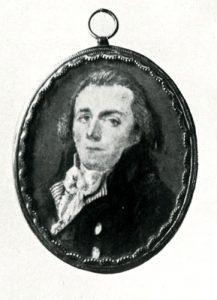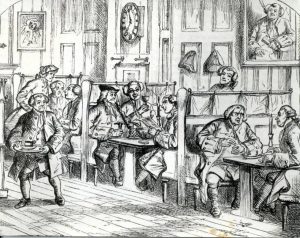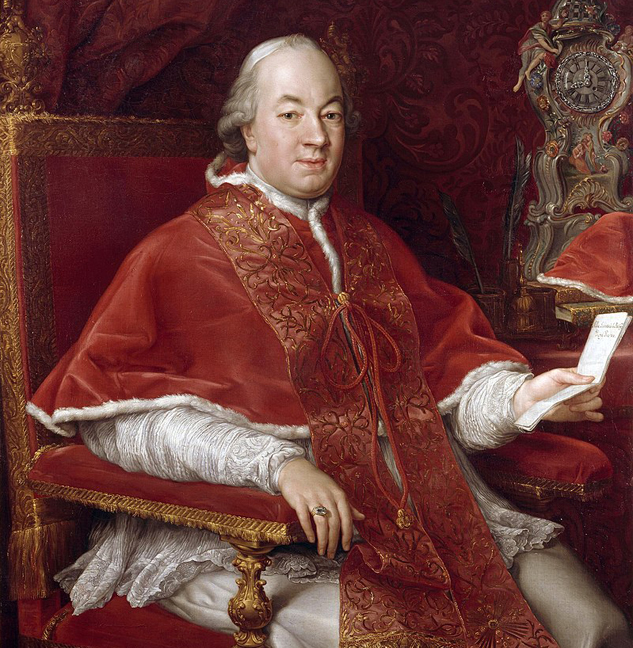Imagine what it would be like to visit London during the waning days of the American Revolution, to hear about attitudes of British officers toward the war and chance to see King George III. Patriot Nathaniel Fanning had this opportunity, and recorded his thoughts and observations in a memoir.

Born in Stonington Connecticut on May 31, 1755, Fanning had a complex maritime career spanning fifty years. He was an American privateer, captain’s clerk, prize master, British prisoner, midshipman/captain-of-the-main top, and most famously sailed under the command of John Paul Jones on the Bonhomme Richard. Fanning later became a French privateer and ultimately a commissioned officer in that country’s navy prior to the war-ending Treaty of Paris. His relatively obscure 1801 memoir is an eyewitness account from the remembrances recorded in his journal. Fanning’s modest education is evident in the work’s grammar, spelling, and punctuation. He stated in his introduction that he did not intend this publication for a general audience. Certainly, the writing style reflects the pen of a sailor rather than a skilled journalist. That noted, this mariner’s memoir is a literary porthole. It includes a chronicle of a junior naval officer’s impressions of the British court and societies at the close of the war.
The following are two excerpts of events that occurred during the spring of 1782 when Fanning left Ostend, Belgium, on a combined business and spy mission to London.
[It is my] custom to visit the coffee-houses, where I heard much said by British officers about the Americans generally.At one of these houses I heard a British officer, who buy his military dress and apaulets upon his shoulders, I took to be a colonel; and who by his conversation with another officer, had served in the British army in America, for upwards of four years; but had then a furlow for a few months. He valued himself a good deal upon taking the poor yankees off, (as he called) in a manner of speaking. I recollect, said he, a person who arrived in Boston about the time that the rebels were collecting their forces near this town, and where I then was, who had got permission to come into town; and who told me that the main road leading from New-York to Boston was covered with men, in an Indian file to join the rebel forces under the command of the rebel general Washington. Those men, thus on their march, were what they called the militia; some of whom were clothed in rags, with a knapsack, or something like it, on their backs, and each hand an old rusty musket up upon their shoulders some of which the gentleman observed, had no locks to them; and some of these men would carry their muskets the butt end of them uppermost in the air, where the muzzle ought to be; with the gun resting sometimes upon the right, and sometimes upon their left shoulder; and these men were frequently several rods from each other. The gentleman in question, to have a little diversion, accost them in a familiar way, in this manner; To one, “Well, my lad, where are you going?” Whose answer would be: Why, to Boston, to fight the enemi—where do you think?[1]
Fanning then heard about the differing attitudes among British officers toward the Americans.

The gentleman would pass on to the next, and so on, putting the same question to each, and they would answer him in the same way. Now, says the colonel to the other British officer, to whom he was directing his discourse, and who it seems had never been in America, “what think you of such kind of fellows as have been describe to you, the American army being at present made with these kind of men? I say . . . continued he, who could have believed that these naked, half paid, half starved, barefooted rebels, would ever have dared to face our regular, well fed, well paid, and well clothed troops? Most certain, replied the other officer, I never did believe it, and more, I never shell. It is too true, my friend, replied the colonel; They have often done it; and besides I could mention a number of instances where the rebels have fairly beaten out our troops, and where our numbers were equal to theirs, and sometimes superior. And this you may rest assured of as an absolute fact, that a regiment of these yankee troops, will always beat a regiment of British troops, provided that each regiment, British and American, consist of an equal number of officers and soldiers; especially when the contest gets to that pitch, when it becomes necessary to decide it at the point of a bayonet. This is true, said the colonel. I have sufficient experience of it; I had enough of this sort of yankee play at Bunker Hill. He then opened his bosom and shewed his friend where he had been wounded in the battle. He then told the officer (who had never been to America) that he had seen enough of the bravery of the Americans; so much so, said he, that I am determined after my furlow is out, if the government orders me to join my regiment again in America, to resign my commission. For, continued the colonel, we shall never be able, with all our fleet and armies, to conquer the Americans, (“hush” said his friend) “I do not care,” replied the colonel, “who hears me, this is my opinion, and I will maintain it even in the presence of the ministry themselves.” The colonel and his friend soon after left the room, and I entered this interesting conversation in one of the pages of my pocketbook, which will have a tendency, among the numbers of a similar kind, to show that a great number of British officers, both in their navy and army, at this time, were of alike opinion. It certainly, in my opinion, indicated an approaching peace between Great Britain and the United States. Are used to frequent this coffee-house, where I heard my countrymen taking off, and was amused with more yankee stories than I had ever heard related in my own country; and at times I have been so much diverted with them that I have nearly burst my sides with laughter.[2]
Fanning then became a tourist. He encountered the king and expressed both his observations and opinions about the monarch and his family.
I was once at Whitehall (the kings palace) on purpose to see his majesty, and waited for some time in a large hall, through which the king was to pass on his way to hear some divine service performed in his chapel, but a small distance from the palace. There were a large crowd of people gathered together out of curiosity to see their king. At length he passed very close to me, accompanied by several lords in waiting, some of whom cried out, “make way for his Majesty to pass;” this is the crowd gateway upon each side, and the king Wachtel on between them. I saw several of these people kneel when he was near them, and attempted to present him (each one) with a paper folded up, which I supposed to have been petitions to his majesty; one of the lords in waiting to receive these petitions from the hands of those who presented them, but neither the king or his lords made any stop, but continued on through the whole nearly as fast as they could walk. I at the moment, thought of my own country, the people of which are without a king; and I hope they may never be cursed with one, with all of the leeches of royalty surrounding the throne (as is here the case) and consuming with greedy appetites the hard earnings of the people. O my country! Bro are you happy, compared to Old England, the subjects of which are at this day (with but a few exceptions) in a state of abject slavery: and the spoutings and trumpetings of royalty, to the contrary notwithstanding. The king, show much adored by the people of England, is a mirror clumsy made man, with round shoulders and a great head, which, as the English themselves say, is not overstocked with good sense; I observed that there was not anything in his countenance which is significant, or that commanded respect. The queen, on the contrary, appeared to have much more of a physiognomy to draw the attention of those who surrounded her; and was generally spoken well of by the subjects of the majesties; and I have no doubt but she was once a tolerable handsome woman. The prince of Wales is also a handsome figure of a man and a great lover of the fair sex.
The author shared a positive note regarding the British government.
I also visited the house of Parliament, where I heard several speeches of the celebrated author Charles Fox, Esq., and who at this time idolized by the people of England, and I noticed that he was toasted often or then the king in all companies where I supped or dined. . . . At this time particularly, he was a strenuous advocate for the liberties of the United States, and which was plainly to be seen in his speeches, even up on the floor of Parliament. I heard him say in this place, “that the best way to reconcile the Americans to the people of Great Britain, was for the British Ministry to the clear them independent, and open a free trade with them at once; and by this step they would have the honor and glory of being bringing about a listing and sincere friendship between the two nations.” These are, as near as I can recollect, his words.[3]
In partial corroboration, some additional Members of Parliament spoke in opposition to the American war during 1781. The noted biographer James Boswell felt that those who could understand, were against the American war. William Pitt, the son of the former prime minister, arose in the House of Commons stating in part,“I am persuaded and I will affirm, that it is a most accursed, wicked, barbarous, cruel, unnatural, unjust, and most diabolical war . . . The expense of it has been enormous . . . and yet what has the British nation received in return? Nothing but a series of ineffective victories or severe defeats.”[4]
Throughout the entire work, the former mariner expresses fervent patriotism palliated with political prehension. Fanning’s observations in this journalist’s quasi-dispatch or tourist’s postcard appear prescient. The Treaty of Paris ending the war was first drafted in November 1782 and adopted in September 1783. Fanning’s memoir was written about 1801, apparently before time blurred his memory or produced the loquacity that sometimes comes with age. The passage of time can distort a narrator’s memory, and that memory can become a self-serving opportunity to place oneself on a pedestal and perhaps vilify enemies. There is no way of confirming of the factuality of the reported incidents and nor any literary embellishments, but Fanning’s motive in publishing his memoir was to describe the incidents from an ordinary participant’s point of view.
[1]Nathanial Fanning, Narrative of the Adventures of an American Navy Officer who served during part of the American Revolution under the command of Commodore John Paul Jones, Esq. 1778–1783 (New York: by the author, 1806; also New York: De Vinne Press, 1912), 169.
[4]Earl Philip Henry Stanhope Stanhope, The Life of the Right Honourable William Pitt (London: John Murray, 1867), 1:61.










One thought on “A Wartime Visit to the Enemy’s Capital”
Fascinating feature on a forgotten patriot! What great observations he made about King George III and British officers. Might we know who sent him on his spy mission to London? Congress, perhaps?